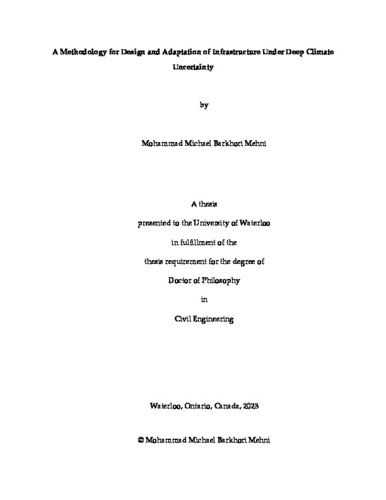| dc.description.abstract | Proper decision-making in design, and adaptation management of infrastructure is essential, in the face of environmental uncertainties. As and example, current climate change models yield a range of widely diverging projections, rendering the allocation of climate change readiness investments increasingly complicated. While a severe climate change scenario may necessitate extensive adaptation investments, realization of a mild or moderate environment after costly system modifications or early adoption of costly adaptation measures would also result in a sense of loss. An alternative approach is resorting to adaptive solutions that commence with reduced costs until the environmental circumstances become more evident.
With the goal of minimizing the sense of loss associated with decision-making, this research integrates the concept of regret into a decision-making framework. Regret serves as a quantifiable metric, capturing decision-makers' desire to mitigate the sense of loss resulting from making incorrect choices. Additionally, the framework incorporates the potential of gaining information over time about climate as it occurs through a dynamic programming scheme.
The research encompasses three studies. Firstly, common design and decision-making approaches are evaluated within the context of climate change. Specifically, an investigation into the nonstationary effects of wind load on structural reliability under the impact of climate change was conducted using several methods. The findings reveal that, under the worst scenario, the lifetime probability of failure can be around twice as high as the baseline without climate change. However, such a scenario-based analysis is not conclusive in decision-making.
To facilitate decision-making in the face of deep climate uncertainty, an innovative methodology is developed and then tested in a second study on bridge corrosion management. In this study, the methodology offers a straightforward decision-making approach when considering the implementation of costly corrosion protection measures in an unknown environment. Additionally, a sensitivity analysis aids in discerning project types and determining the optimal course of action, whether it involves waiting or investing in field testing.
Finally, the third study is an application of the methodology in the context of climate change by addressing the design and managed adaptation of a river-crossing bridge exposed to climate change-induced scour. The study showcases how the methodology can assess trade-offs among different design options and determine the optimal course of action, given the uncertainties surrounding future climate scenarios. By evaluating the trade-offs between inaction and costly adaptations, the research identifies conditions under which a wait-and-see approach is effective and when incorporating design flexibilities for future adaptations is warranted. Furthermore, the method's performance is evaluated, and a comparison of various decision-making methods for adaptation is presented. The analysis demonstrates that in the case study, incorporating the potential for information arrival can yield up to $3.5 million in benefits, where an indirect cost of failure amounts to $10 million. Consequently, this framework empowers designers and asset managers to navigate the uncertainties of climate change in their decision-making processes effectively.
The outcomes of this research contribute to the advancement of decision-making approaches for infrastructure design and adaptation in the face of climate uncertainties. By integrating deep uncertainties into decision-making processes and proposing an innovative methodology, this research assists infrastructure owners, managers, and policymakers in enhancing the resilience and long-term sustainability of infrastructure systems in an uncertain future climate. | en |

